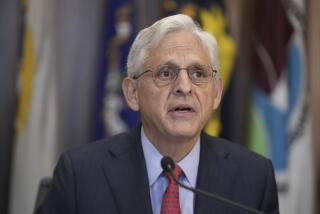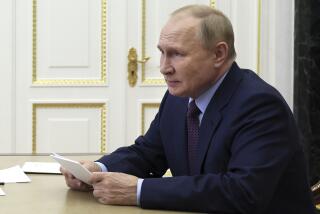Russia’s Stance on Neighbors Irks U.S.
- Share via
WASHINGTON — The Bush administration Monday reinforced its critical stance toward the Russian government of Vladimir V. Putin by questioning its commitment to democracy in nearby Ukraine and Belarus.
A senior State Department official, who spoke on condition of anonymity, citing department policy, said the Russians had become “reactive and defensive” toward democratic movements on their periphery. The official said that this was illustrated by Moscow’s support of recently reelected President Alexander G. Lukashenko in Belarus and its backing for former Prime Minister Viktor Yanukovich’s bid to reclaim power in Sunday’s parliamentary contest in Ukraine.
“In many cases we wish that Russian policy were more clearly aimed at promoting consolidation of stable democracies,” he said.
Relations between the U.S. and Russia, especially strong during President Bush’s first term, have increasingly shown signs of fraying. The administration has begun reassessing its broader policy on Russia, in light of what Washington considers Moscow’s anti-democratic moves at home and abroad.
The U.S. reassessment follows recent differences over Iran’s nuclear enrichment program and friction over a Pentagon report last week that asserted Russia had provided Saddam Hussein’s government with intelligence information on American plans for the March 2003 invasion of Iraq. U.S. Secretary of State Condoleezza Rice, citing Russia’s increasing control over the news media and encroachments on civil liberties, warned this month against “the centralization of power in the Kremlin.”
At least one analyst sees the U.S. comments not as a message to Moscow, but an expression of frustration that Russia has repeatedly countered Washington’s wishes.
“You’re hearing the voice of someone who is just fed up,” said Russian expert Michael McFaul of the conservative Hoover Institution at Stanford University. “The president has expended an enormous amount of time and attention to courting Putin, and the policy is not paying returns.”
Russian officials have supported Lukashenko, whose reelection March 19 has been widely condemned for suspected voting irregularities. The Kremlin also supported Yanukovich, who was ousted in the 2004 Orange Revolution in Ukraine, but whose party appears to have won the largest bloc of seats in Sunday’s balloting.
Russian officials “need to be asked why it is they find themselves in support of a dictator in Belarus, rather than standing with democratic forces,” the senior State Department official said. “It’s not true that democracy is a synonym for weakening Russia. That’s silly.”
Citing the crackdown on postelection protests in Belarus, the official said that “there is something very ... Soviet” about the Lukashenko government.
“That reminds me of Poland in 1983 -- tear gas, police, people being dragged off,” he said, referring to a time when the then-Communist Polish government had declared martial law in response to mass demonstrations. “That is not democracy.”
The official said that for the last 10 years, the Russians have been concerned that expansion of NATO and the European Union “would somehow weaken them, or was directed against them. It really isn’t.”
At the same time, the official sought to emphasize that on many issues, the U.S. and Russia were not in complete opposition.
The two nations collaborate on Arab-Israeli issues, and both are seeking a resolution on Kosovo, a United Nations protectorate whose ethnic Albanian leadership is seeking independence. Though Russia has countered U.S. attempts to obtain a U.N. Security Council declaration critical of Iran over its nuclear enrichment program, the official said the difference was mainly over “tactical issues.”
More to Read
Sign up for Essential California
The most important California stories and recommendations in your inbox every morning.
You may occasionally receive promotional content from the Los Angeles Times.











